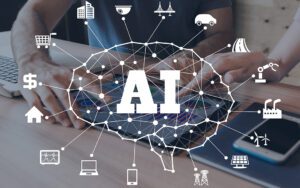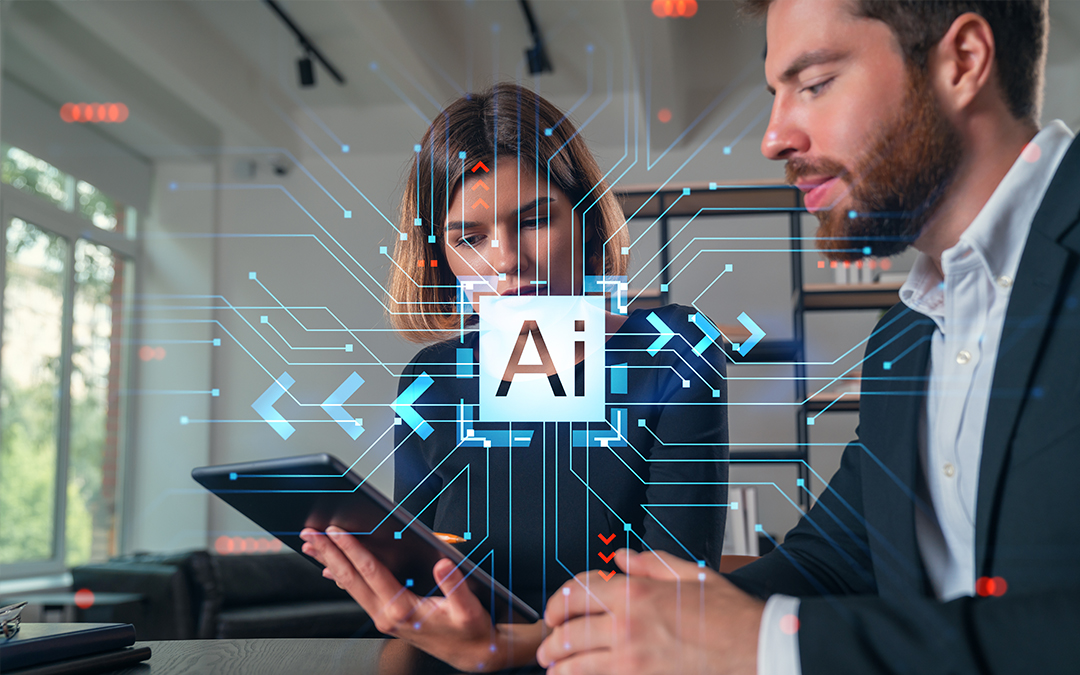Businesses and employees are grappling with how to build skills for generative AI adoption. How is AI used in the workplace? Is your workforce ready?
There’s no denying that the rapid and recent emergence of generative artificial intelligence is a transformative force, reshaping the way we work and interact with technology. And, as with other transformative technologies that have come before, businesses and employees are grappling with how to optimize adoption while aligning and preparing workers for what’s next. How is AI used in the workplace? Is your workforce ready?
AI in the Workplace
“AI should not be portrayed as a fearsome monster. It will certainly create many new headaches.
Yet, over time, it will hopefully solve many [problems] we have today – just as all previous introductions of disruptive technologies have done.”
– Tom Grobicki, CEO of Avilar Technologies
AI has been around, in some form, for decades. In recent years, AI has been used to automate repetitive tasks at work, with applications in customer service, software development, data analysis, and much more.
What’s newer, since the explosive introduction of ChatGPT in November 2022, is the number of generative AI applications in the workplace, which has skyrocketed over the past 18 months. Generative AI is revolutionizing jobs and industries across the globe. It is being used for content generation (articles, blogs, reports), data augmentation (generating synthetic data for machine learning models), visual design (creating art and logos, website layouts), virtual assistance, project management, and much more!
There are many benefits of AI in the workplace. As employers embrace this technological shift, business and HR leaders need to understand the skills they need for the company to thrive in this new world. And their employees will need to cultivate the right skills to thrive (and help the company thrive) in an AI-powered workplace.
Skills Needed for AI
 Generative AI is expected to improve productivity across industries, affecting some job roles and workers more than others. “Historically, automation has affected workers with lower education and skill levels. Gen AI is flipping the script: more-educated workers will likely experience the greatest degree of impact,” says McKinsey Quarterly in this handy infographic.
Generative AI is expected to improve productivity across industries, affecting some job roles and workers more than others. “Historically, automation has affected workers with lower education and skill levels. Gen AI is flipping the script: more-educated workers will likely experience the greatest degree of impact,” says McKinsey Quarterly in this handy infographic.
Still, though some employers have been touting AI adoption as a reason to reduce the size of their workforce, Axios posits that “the new trend in tech company layoffs could be less about replacing workers with AI, and more about replacing workers with a smaller number of workers who are more skilled in AI, for now.”
Analysts and experts agree that AI is disrupting and will continue to disrupt the workforce. And there remains a deep conviction that AI will (and will not) be able to assume the role of humans at work.
So, which skills are needed to thrive in an AI-powered workplace? Among others, AI technical proficiency and a range of people skills top the list.
- Adaptability: With AI constantly evolving and disrupting traditional workflows, adaptability emerges as a crucial skill. Employees must demonstrate the ability to adapt to new technologies, processes, and work environments swiftly. Whether it’s embracing AI-driven tools or adjusting to changing job roles, adaptability is increasingly key for individuals and companies to thrive amidst uncertainty.
- Data Literacy: In an AI-driven world, data is the fuel that powers decisions and outputs. Employees should possess a strong foundation in data literacy to interpret and analyze complex datasets effectively – including those that come from generative AI. From understanding key metrics to drawing actionable insights, proficiency in data literacy enables employees to make informed decisions and drive business growth.
- Critical Thinking: While AI can automate routine tasks, critical thinking is an indispensable human skill essential to smart problem-solving and decision-making. Employees must be able to evaluate information critically, identify patterns, and anticipate potential challenges. By building and using critical thinking skills, individuals can navigate ambiguity and devise innovative solutions that companies need for a competitive edge.
- Creativity: Creativity remains a uniquely human trait. Employees must harness their creative abilities to imagine new solutions, design compelling experiences, and drive innovation. This includes leveraging generative AI outputs to advance ideas and solutions. Whether it’s crafting engaging content or conceptualizing novel products, creativity fosters a culture of innovation that is essential for staying ahead in the AI era.
- Emotional Intelligence: Despite advancements in AI, human interaction remains an essential ingredient of a healthy workplace. By understanding and managing emotions, employees can successfully navigate interpersonal relationships, collaborate effectively, resolve customer questions or concerns, and foster a positive work environment.
- Tech Savviness: Even before generative AI, employees across the enterprise needed to possess a strong aptitude for technology and demonstrate some level of tech proficiency. Now, most employees will need some level of proficiency with relevant AI-driven tools and platforms – as well as an understanding of the limitations of generative AI algorithms. Whether it’s coding, machine learning, cybersecurity, marketing, project management, or customer support, staying abreast of technological advancements equips individuals and companies to harness the best of generative AI for greater efficiencies and better outcomes.
- Continuous Learning: As AI reshapes industries and job roles, the importance of continuous learning cannot be overstated. Employees must adopt a growth mindset and commit to lifelong learning to stay relevant in the face of technological disruption and to keep adopting best practices in their career field, industry, and with the use of generative AI. Whether it’s upskilling in AI-related domains or pursuing professional certifications, investing in continuous learning helps individuals and companies to be ready to seize new opportunities.
- Ethical Awareness: With AI wielding significant influence, ethical considerations come to the forefront. Employees must learn to navigate complex ethical dilemmas surrounding data privacy, bias, and algorithmic transparency. By adhering to ethical principles and exercising sound judgment, individuals can ensure the responsible use of AI technologies and mitigate potential risks for themselves and their employers.
 Skills development is key to navigating the AI revolution. If you haven’t already, it’s time to update your company’s competency model to include skills for these times. Then, assess, develop, and optimize the skills of your workforce to position your employees and your organization for our AI-powered future. Armed with the right skills, there are nearly limitless possibilities ahead. The future belongs to those who dare to adapt, innovate, and evolve.
Skills development is key to navigating the AI revolution. If you haven’t already, it’s time to update your company’s competency model to include skills for these times. Then, assess, develop, and optimize the skills of your workforce to position your employees and your organization for our AI-powered future. Armed with the right skills, there are nearly limitless possibilities ahead. The future belongs to those who dare to adapt, innovate, and evolve.
If you’re thinking of how to best prepare your company and your workforce for an AI-powered workplace, download our Competency Management Toolkit for the basics of aligning company and employee skills across your organization. Or contact us to see if Avilar’s WebMentor Skills™ competency management system can help with your initiative.
RELATED RESOURCES
Generative AI: Friend or Foe to the Workforce? Insights for Business Leaders
How to Reach Your Competency Management Objectives in the Age of AI
Using a LMS to Support Your Competency Management Program
The Future of Workforce Management: 6 Trends with Staying Power for 2024
Five Ways AI Can Help Close the Skills Gap of Your Workforce


 Yet, over time, it will hopefully solve many [problems] we have today – just as all previous introductions of disruptive technologies have done.”
Yet, over time, it will hopefully solve many [problems] we have today – just as all previous introductions of disruptive technologies have done.” 